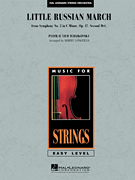Little Russian March (from Symphony No. 2)
Buy this item (out of stock)
Product ID: HL2 04491161
By Pjotr Illych Tchaikovsky
Publisher:
Hal Leonard
Arranger:
Longfield
Series:
Easy Music for Strings
Genre:
Romantic Era
Line Up:
String Orchestra (Solo: Unknown)
Level: 2
Set & Score
This item is out of stock
About this item
The colorful, tuneful march from Tchaikovsky's second symphony, considered to be one of his most joyous works, makes an ideal teaching piece with its distinctive dotted 8th-16th note figure throughout. The nickname “Little Russia” was given to the symphony based on its use of Ukrainian folk songs.
Songlist (1)
- Little Russian March (from Symphony No. 2)
Instrumentation
1 FULL SCORE: 8 pag.
8 VIOLIN 1: 1 pag.
8 VIOLIN 2: 1 pag.
4 VIOLIN 3: (VIOLA T.C.) 1 pag.
4 VIOLA: 1 pag.
4 CELLO: 1 pag.
4 STRING BASS: 1 pag.
1 PIANO: 3 pag.
Reviews and rating
No review available, be the first to write one!

Composer
Pjotr Illych Tchaikovsky (1840-1897)
Pyotr Ilyich Tchaikovsky (May 7, 1840 – November 6, 1893) was a Russian composer of the Romantic era. His wide-ranging output includes symphonies, operas, ballets, instrumental, chamber music and songs. He wrote some of the most popular concert and theatrical music in the classical repertoire, including the ballets Swan Lake, The Sleeping Beauty and The Nutcracker, the 1812 Overture, his First Piano Concerto, his last three numbered symphonies, and the opera Eugene Onegin.
Born into a middle-class family, Tchaikovsky was educated for a career as a civil servant, despite his obvious musical precocity. He pursued a musical career against the wishes of his family, entering the Saint Petersburg Conservatory in 1862 and graduating in 1865. This formal, Western-oriented training set him apart from the contemporary nationalistic movement embodied by the influential group of young Russian composers known as The Five, with whom Tchaikovsky's professional relationship was mixed.
More info about the composer...



 Click above to view samples
Click above to view samples
